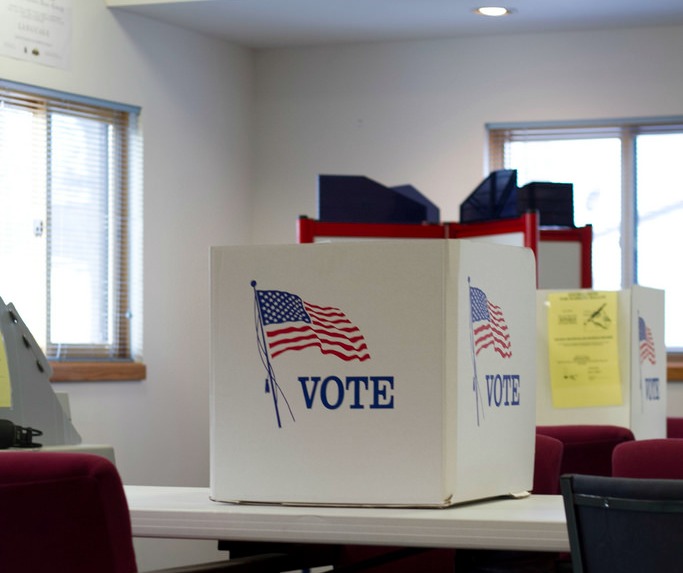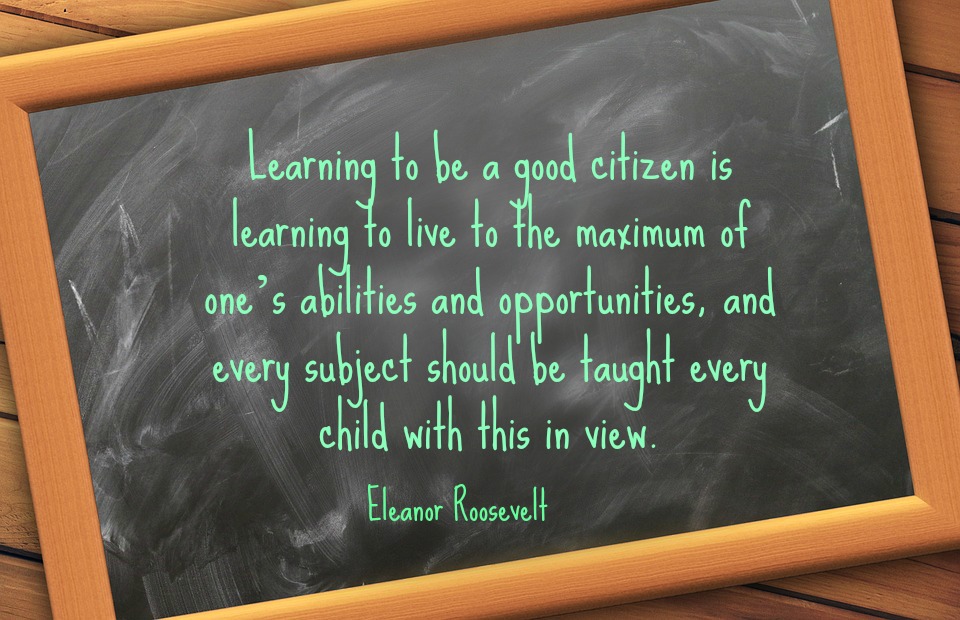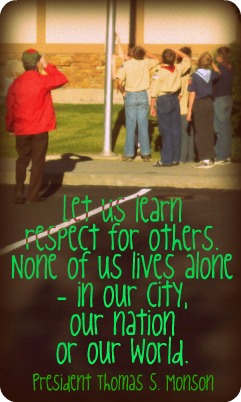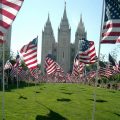Religion and politics are two topics that incite perhaps the most heated debates in our country— especially during a presidential election year. Every four years the presidential campaigns seem to get increasingly nasty. Even in my own family we can’t agree which is the best candidate. The whole thing seems to be a mess, and it would be easy to just sit this one out. But as my brother and I were discussing politics and the state of the nation, he said something that really got me thinking. My brother has been in the military for years and has been all over the world. He said, “If you ask me what makes America great, it’s her infrastructure. If you call the police, they’ll respond. If there’s a fire, the fire department will show up. If you need an ambulance, the EMTs will come to your house or wherever you are. In some other countries, they don’t have that luxury. If someone breaks into your house and threatens you and your family, no one will come to help you.”
That is a sobering thought. And it got me to thinking about how much we take for granted here. Why do police officers, EMTS and firemen (and women) respond to a cry for help? Because individuals have stepped up to answer the call of duty. They have dedicated their lives to a higher calling as protectors of the citizens of the state, county, city or locale in which they serve. But there is another answer as well. Police officers are more effective when the majority of those they are protecting abide by the laws of the land. They can serve and protect because they have good citizens who are honoring and sustaining the laws. The citizens are part of the process. We don’t often think of that aspect of citizenship when we hit the polls in November. But it’s all part of the same process—of buying into and being part of your community, your state and your nation. Additionally, members of The Church of Jesus Christ of Latter-day Saints believe that citizenship is an important aspect of living the gospel of Jesus Christ. We all have a responsibility to help make our communities run smoothly. So as we head into the final stages of the presidential elections, here are 3 ways that we can be better citizens, better voters, better Christians.
1. Be an informed voter and citizen.
Education is an important aspect of being an informed citizen. Lawrence C. Walters, at the time a professor in the BYU Romney Institute of Public Management, said,
Being an active citizen in our society requires … commitment to learning …. Eleanor Roosevelt once observed that “learning to be a good citizen is learning to live to the maximum of one’s abilities and opportunities, and every subject should be taught every child with this in view.” … She saw producing citizens as the true purpose of education, and I agree.
… Active citizens … must prioritize and focus their attention on the most significant issues. They then do their research, critically evaluate information, and analyze carefully. They cultivate the ability to examine problems from the multiple perspectives that may be relevant. They seek to learn and understand all they can on any given issue. (Citizenship, BYU Speeches, April 1, 2014)
This applies not only during elections but all the time. We need to stay informed so that we know what issues are facing our community and our families. It’s so easy to run into the election booth blind—without really studying the issues and the candidates. I am guilty of that at times. But do we really make the best decisions on the fly, without all of the facts? Elder Dallin H. Oaks said,
The few months preceding an election have always been times of serious political divisions, but the divisions and meanness we are experiencing in this election, especially at the presidential level, seem to be unusually wide and ugly. Partly this results from modern technology, which expands the audience for conflicts and the speed of dissemination. Today, dubious charges, misrepresentations, and ugly innuendos are instantly flashed around the world, and the effects instantly widen and intensify the gaps between different positions. TV, the internet, and the emboldened anonymity of the blogosphere have facilitated the current ugliness and have replaced whatever remained of the measured discourse of the past. Nevertheless, as the First Presidency always reminds us, we have the responsibility to become informed about the issues and candidates and to independently exercise our right to vote. Voters, remember, this applies to candidates for the many important local and state offices, as well as the contested presidential election.
We need to do our homework. We can’t just assume that media pundits are accurately describing the candidates and the issues. We need to look at all sides before making a decision. We need to look at the way things will affect us not only now but also down the road.
For Latter-day Saints, part of doing our homework is gaining an understanding of how these issues affect our ability to live according to our religious beliefs—our religious freedom. Not just the religious freedom of the Latter-day Saints, but believers of all religious denominations. Elder Oaks said,
For many years I have paid close attention to the social and legal trends that are likely to affect the fundamental guarantees that are so vital to fulfill our Church’s mission and to accomplish BYU’s educational mission. I am convinced that a worldwide tide is currently running against both religious freedom and its parallel freedoms of speech and assembly.
I believe religious freedom is declining because faith in God and the pursuit of God-centered religion is declining worldwide. If one does not value religion, one usually does not put a high value on religious freedom. It is looked at as just another human right, competing with other human rights when it seems to collide with them. I believe the freedoms of speech and assembly are also weakening because many influential persons see them as colliding with competing values now deemed more important. Some extremists have even opposed free speech as an obstacle to achieving their policy goals.
We can make the best decisions for ourselves and our families when we are informed of the issues and challenges of our day.
2. Get involved—but avoid the fray.
Once we are informed and educated on the issues, we need to do something about it. We can’t make a difference if we don’t get involved. For several years, our school hosted a spring carnival, and my kids loved it. But then one year, it was canceled. I found out that the reason it was canceled was there weren’t enough volunteers. I had taken the carnival and the effort it took for granted. So the next year, I started attending the planning meetings and joined the PTA (yes, in that order). I realized that I needed to get involved in the process to help make things happen for our school.
The same is true in politics, in our communities and elsewhere. We need to be a nation of active citizens. We need to allow our voices to be heard, but we don’t need to descend into the fray of chaos and contentious debate. My second year in the PTA, members decided against hosting another spring carnival. It was too much work with too few volunteers. I was outvoted. Although I was disappointed, we decided to host a different spring event. A color run. Which was hugely successful and a lot of fun. It was the right choice for our school.
Being part of the community means not only airing our concerns but also listening to others with respect and kindness. It’s easier to do with at PTA meetings, but sometimes difficult with highly charged political, social or cultural issues. Elder Oaks said,
We should also remember not to be part of the current meanness. We should communicate about our differences with a minimum of offense.
Elder M. Russell Ballard taught,
If our [Latter-day Saint] history teaches us nothing else, it should teach us to respect the rights of all people to peacefully coexist with one another.
I now speak to all those who are not of our faith. If there are issues of concern, let us talk about them. We want to be helpful. Please understand, however, that our doctrines and teachings are set by the Lord, so sometimes we will have to agree to disagree with you, but we can do so without being disagreeable. In our communities we can and must work together in an atmosphere of courtesy, respect, and civility. Here in Utah, a group of concerned citizens formed the Alliance for Unity. This effort has been endorsed by our Church as well as other churches and organizations. One of its purposes is “to seek to build a community where differing viewpoints are acknowledged and valued.” Perhaps there has never been a more important time for neighbors all around the world to stand together for the common good of one another.
Sometimes in our efforts we are outvoted. Sometimes it’s the better outcome, and sometimes not. Elder Oaks said,
When our positions do not prevail, we should accept unfavorable results graciously and practice civility with our adversaries. In any event, we should be persons of goodwill toward all, rejecting persecution of any kind, including persecution based on race, ethnicity, religious belief or nonbelief, and differences in sexual orientation.
We can make a difference when we get involved. Sometimes we can’t change the outcome, but sometimes we can. But it’s our responsibility to try.
3. Teach the next generation of citizens and voters.
We need to teach our children how to be good citizens. The Family: A Proclamation to the World teaches:
Parents have a sacred duty to rear their children in love and righteousness, to provide for their physical and spiritual needs, and to teach them to love and serve one another, observe the commandments of God, and be law-abiding citizens wherever they live. Husbands and wives—mothers and fathers—will be held accountable before God for the discharge of these obligations.
Being a good citizen includes voting. It’s easy to get discouraged when our candidates don’t get elected or the ballot initiative for which we voted didn’t pass. But we cheat ourselves—and our children—when we opt out of the process. Children learn by what we do as well as by what we say. When we make the effort to go to the polls and vote, we teach our children by example that voting is important. When we get involved in the community, we do the same. My older 3 kids ask me why I joined the PTA after their time in elementary school. They don’t understand the importance of the work that I’m doing. But I tell them that they were the beneficiaries of someone else’s work. Someone else helped with the Box Tops and the carnivals and the other PTA events when they were younger because I couldn’t. Now I can, and it’s my turn.
Teaching our kids by example includes the attribute of civility in our discourse. Elder Quentin L. Cook said,
The need for civility in society has never been more important. The foundation of kindness and civility begins in our homes. It is not surprising that our public discourse has declined in equal measure with the breakdown of the family. The family is the foundation for love and for maintaining spirituality. The family promotes an atmosphere where religious observance can flourish. There is indeed “beauty all around when there’s love at home.”
Citizenship begins in the home, teaching our children to love and serve each other and that each one has the responsibility to help our home run smoothly. Professor Walters said,
There are at least two ways to think about citizenship. The first sees citizens as having certain rights that should be protected by law. Those who hold this view see “citizenship as [a] legal status” and are concerned mostly with defending individual freedoms from interference by others. There is no question that rights are an important aspect of citizenship. All too often, however, in today’s world this approach to citizenship descends into a type of consumerism: citizens see themselves as no more than customers of government.
A government’s efforts to improve their operations by focusing on citizens as customers are certainly valuable. My concern is with the way we act when we think of ourselves as customers of government. Consumer citizenship is something we assert only occasionally. We exercise our right to vote every year or two, maybe—when we go to the polls or “the store” to choose what we want from a list. If we don’t like what is on the list, we may not even go to the store. If there is a problem in the community, we expect the government to deal with it. Most of the time, though, we just want to be left alone. We either actively avoid or at least ignore what is going on with governments. “After all,” we say, “there is not much we can do about it anyway.” We would certainly never think about what we do at work or at school or in the neighborhood in terms of citizenship. …
The second vision of citizenship is more demanding and is captured well in a definition offered by Peter Block:
A citizen is one who is willing to be accountable for and committed to the well-being of the whole. That whole can be a city block, a community, a nation, the earth. A citizen is one who produces the future, someone who does not wait, beg, or dream for the future.
The antithesis of being a citizen is the choice to be a consumer or a client.
True citizenship is being part of the process and taking ownership in the results. It isn’t easy and requires work—sometimes a lot of hard work. But it is what’s required of us. Professor Walters continued,
We often see references to a quote from Theodore Roosevelt about “the man who is actually in the arena . . . ; who does actually strive to do the deeds; . . . who spends himself in a worthy cause; . . . who . . . , if he fails, at least fails while daring greatly.” What is less often remembered is that Roosevelt was describing what it means to be a citizen.






